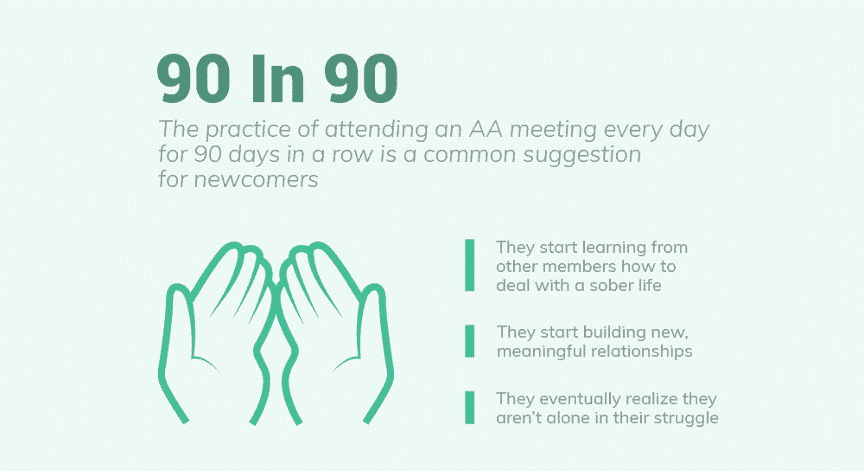The Importance of 90 Meetings in 90 Days and Tips on How To Stay Sober
There are thousands of Americans daily who are trying to figure out how to stay sober. They might have checked themselves into a detox program, rehabilitation facility, or are attending a twelve-step program like Alcoholics Anonymous for the first time ever. Almost 21 million Americans have at least 1 addiction, yet only 10% of them receive treatment1. How does one stay sober when alcohol is part of our social fabric, encouraged at work functions and family celebrations, and is widely advertised on television? Friends and family will probably suggest alternative tips on how to stay sober, such as cutting back and finding a hobby, but these aren’t long-standing in the fight against a chemical and mental addiction.

So here are the three main tips on how to stay sober:
- 90 AA/NA meetings in 90 days
- Therapy to identify triggers and cope with stress
- Creating lasting connections with fellow sober people
Let’s explore each of these tips on how to stay sober.
What Is Sobriety?
Before diving into how to stay sober, it’s best to define what sobriety exactly means to someone with a substance use disorder, or a SUD2, as described by the Addiction Center and listed in the DSM 5. In a twelve-step program like Alcoholics Anonymous or Narcotics Anonymous, sobriety is characterized by a total refrainment from any mind-altering substance. For others, sobriety might be the limited or fully removed use of their drug of choice, like a cocaine user staying off cocaine but still drinking socially. These definitions are personal in nature, but the general association with the term sobriety involves total abstinence from psychoactive chemicals.

90 Meetings in 90 Days
Most addicts and alcoholics feel alone and unable to connect with the harshness of reality, much less to other people. According to Psychology Today writer Robert Weiss, Ph.D., the opposite of addiction is connection. Weiss writes, “In truth, the often-parallel work of 12-step recovery programs and formalized addiction treatment programs – after the initial experience of detox – involves connecting the addict to other people. And not just any people, either. We’re talking about safe, supportive, reliable empathetic people.”3 The first step in getting connected is finding people and groups where you can find refuge from your addiction and gaining some physical sobriety under your feet. Some find their physical sobriety through a combination of first entering a detox program, then sober living houses, and upon leaving these places, attending AA or NA in whatever capacity they see fit for the rest of their lives. Some people don’t feel the need to enter a detox or sober living and go straight for 12-step groups. For these individuals, it is highly suggested you attend 90 meetings in 90 days. 90 meetings in 90 days might seem excessive, but it will give you a chance to meet as many fellow alcoholics and addicts as possible and discover which meetings you are most comfortable with. You will have endless opportunities to find a sponsor, someone who has many years of sobriety under their belt, who will take you through the 12 steps of AA/NA. Attending 90 meetings in 90 days is only one tip on how to stay sober.

Reach out to Hotel California by the Sea
We specialize in treating addiction and other co-occurring disorders, such as PTSD. Our Admissions specialists are available to walk you through the best options for treating your addiction.
Tips on How to Stay Sober
After going through 90 meetings in 90 days and achieving physical sobriety, it’s time to live whole life sober. Sounds daunting? In almost all cases, complete abstinence is just one tip on how to stay sober and maintain a healthy and rewarding life. Detox centers and peer support groups help one maintain physical sobriety and fight off urges to use, and by joining a group of like-minded individuals, you will likely build lasting interpersonal relationships with them. Attending each other’s sobriety birthdays, weddings, and holiday celebrations make these often triggering events easier to bear. Being able to call someone with the same history of addiction and background as you after an argument with a partner or a tough workday will help you feel less alone and more capable of handling life. Having a support system to fall back on when your own self-will is tarnished is why addicts and alcoholics will continuously attend groups, meetings, and stay active in treatment centers long after their last drink or drug. Building relationships with fellow sober people is perhaps the most crucial out of all the tips on how to stay sober.
There are other tips on how to stay sober. Therapy can also be a great addition to a sober toolkit. Therapists can help you identify triggers, find alternative ways to deal with stress, and recognize potential warning signs for a relapse before they come into fruition. There are many different things that can trigger the urge to drink or get high. According to verywellmind.com4, stress, emotional distress, environmental cues, hanging around others who are still using drugs and drinking, relationship troubles, and job or financial problems are what many alcoholics and addicts say cause them to relapse. When discomfort pertaining to a trigger arises, it is best to recognize it quickly and take actions to move in a healing direction. Warning signs that you may be returning to a relapse are “returning to addictive thinking patterns, engaging in compulsive, self-defeating behaviors, seeking out situations involving people who use alcohol or drugs, thinking less rationally and behaving less responsibly, and finding yourself in a situation in which drug or alcohol use seems like a logical escape from pain”5. You must be ready to look at the psychological reasoning behind your addiction in figuring out how to stay sober.
Check Your Insurance Coverage for FREE
Find out if your insurance covers addiction treatment in minutes. We accept most insurance!
Staying busy and developing a fixed schedule is also another great way to stay sober. Most alcoholics and drug addicts live a very disorganized and chaotic life. In sobriety, structuring a steady schedule will help you maintain emotional balance and not fall into feelings of frenzy and disarray. Unfortunately, relapse is something that will happen to many hopeful recovering addicts and alcoholics. According to Amatus Recovery Center, around 40-60% percent of people who have been treated for addiction relapse within the first year6. This may seem like a scary number, but it is important to not lose hope over a slip-up. Give yourself a break when figuring out how to stay sober, and understand relapse is potentially part of your journey to share with others. Locking in physical sobriety with 90 meetings in 90 days, finding connection through peer support groups, spending time with fellow recovering alcoholics, pinpointing triggers, and finding new ways of dealing with stress are some great tips on how to stay sober.
References:
